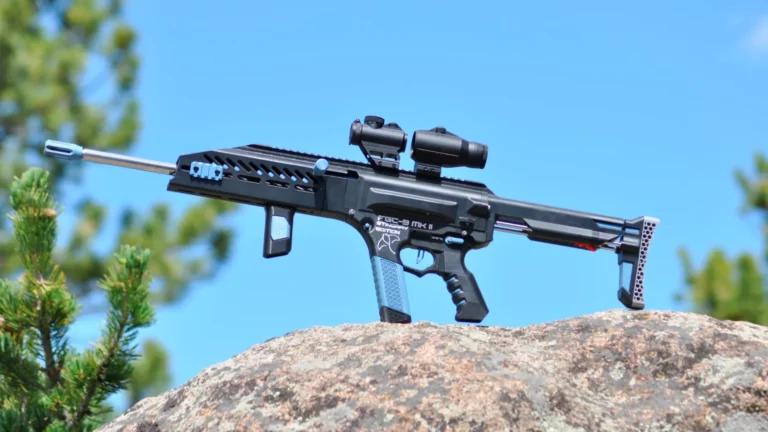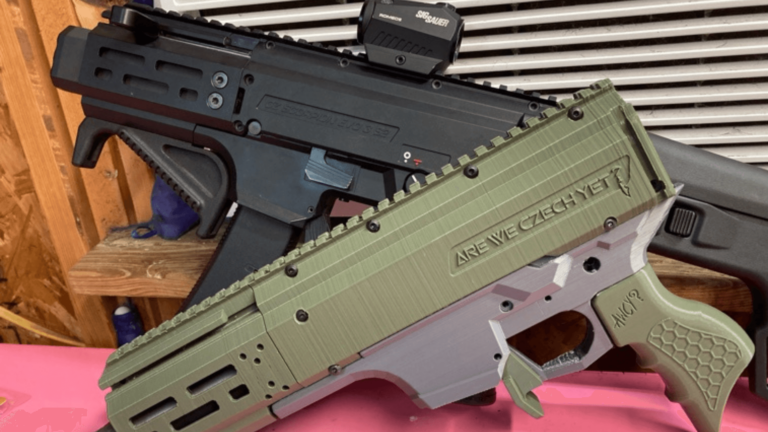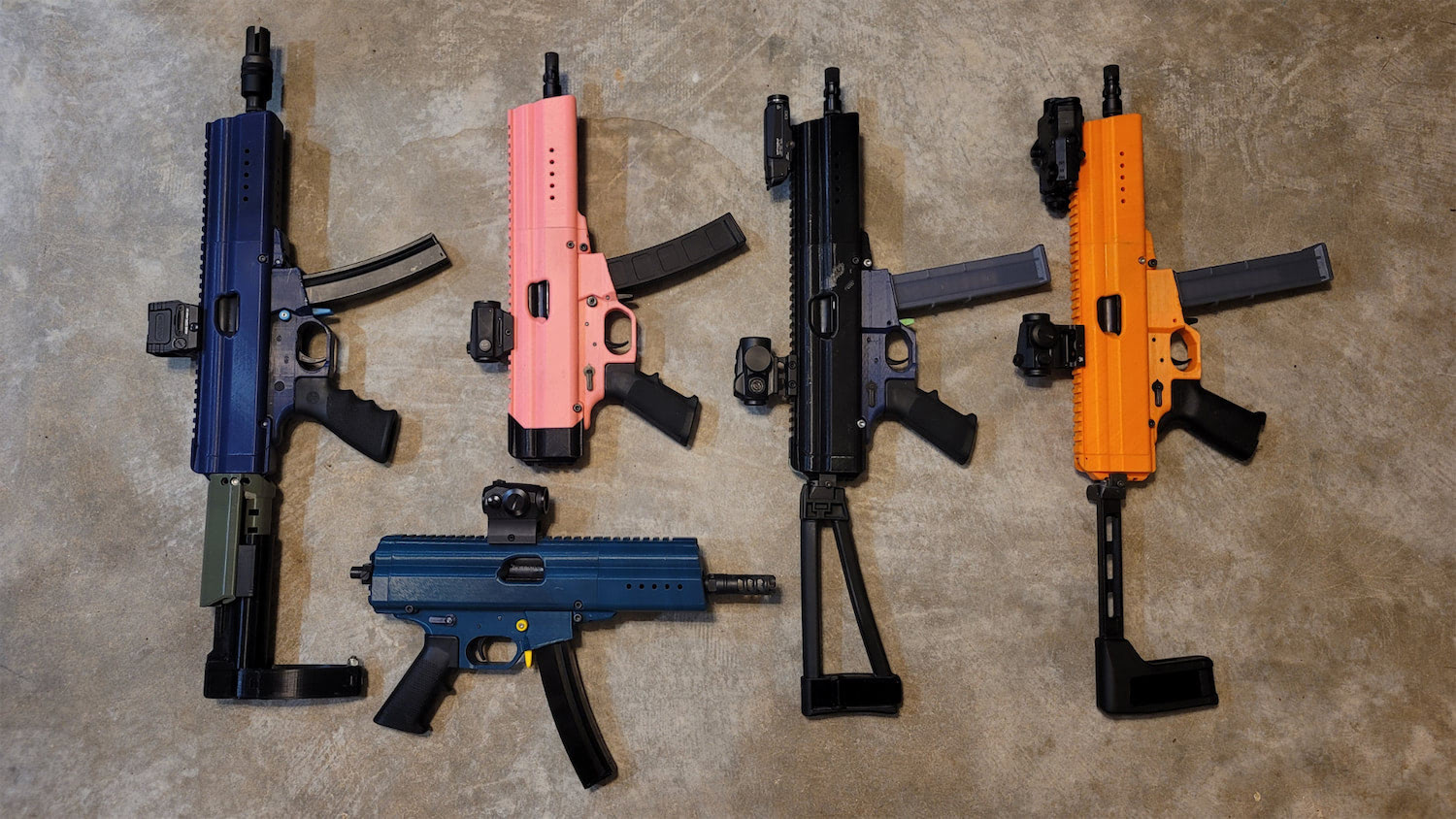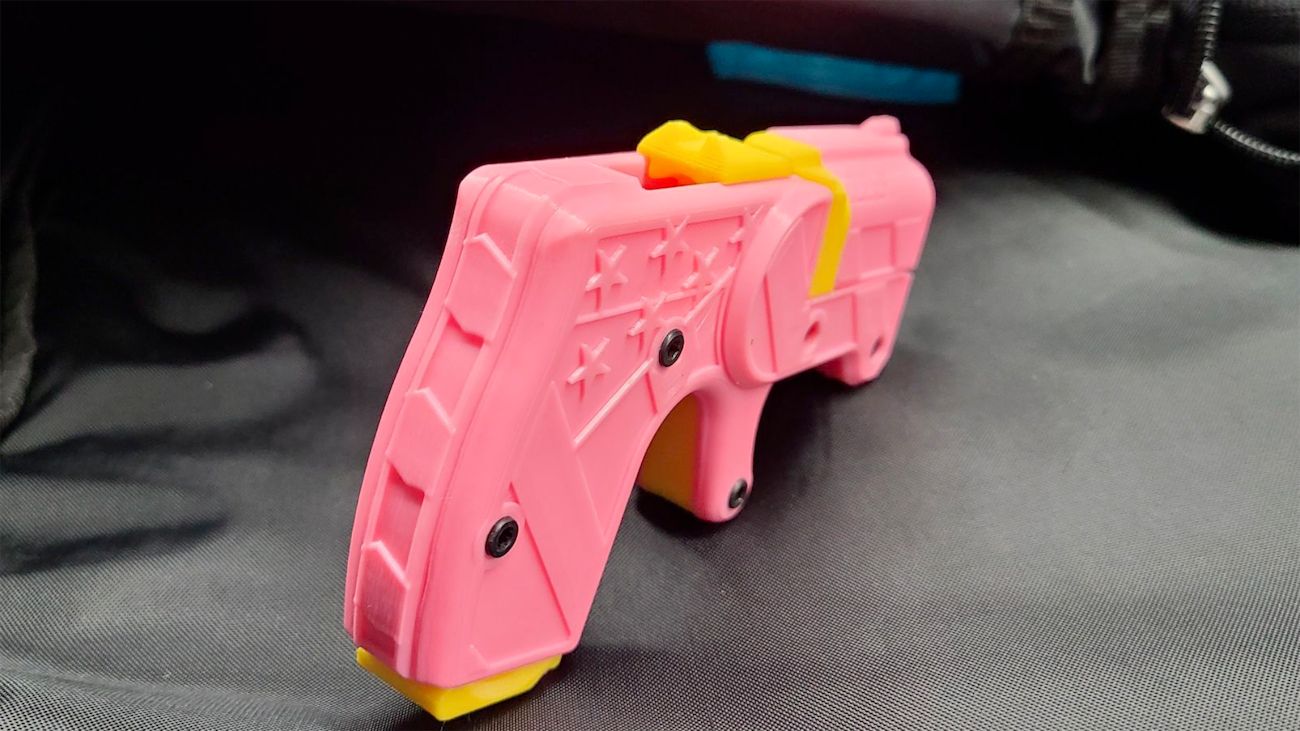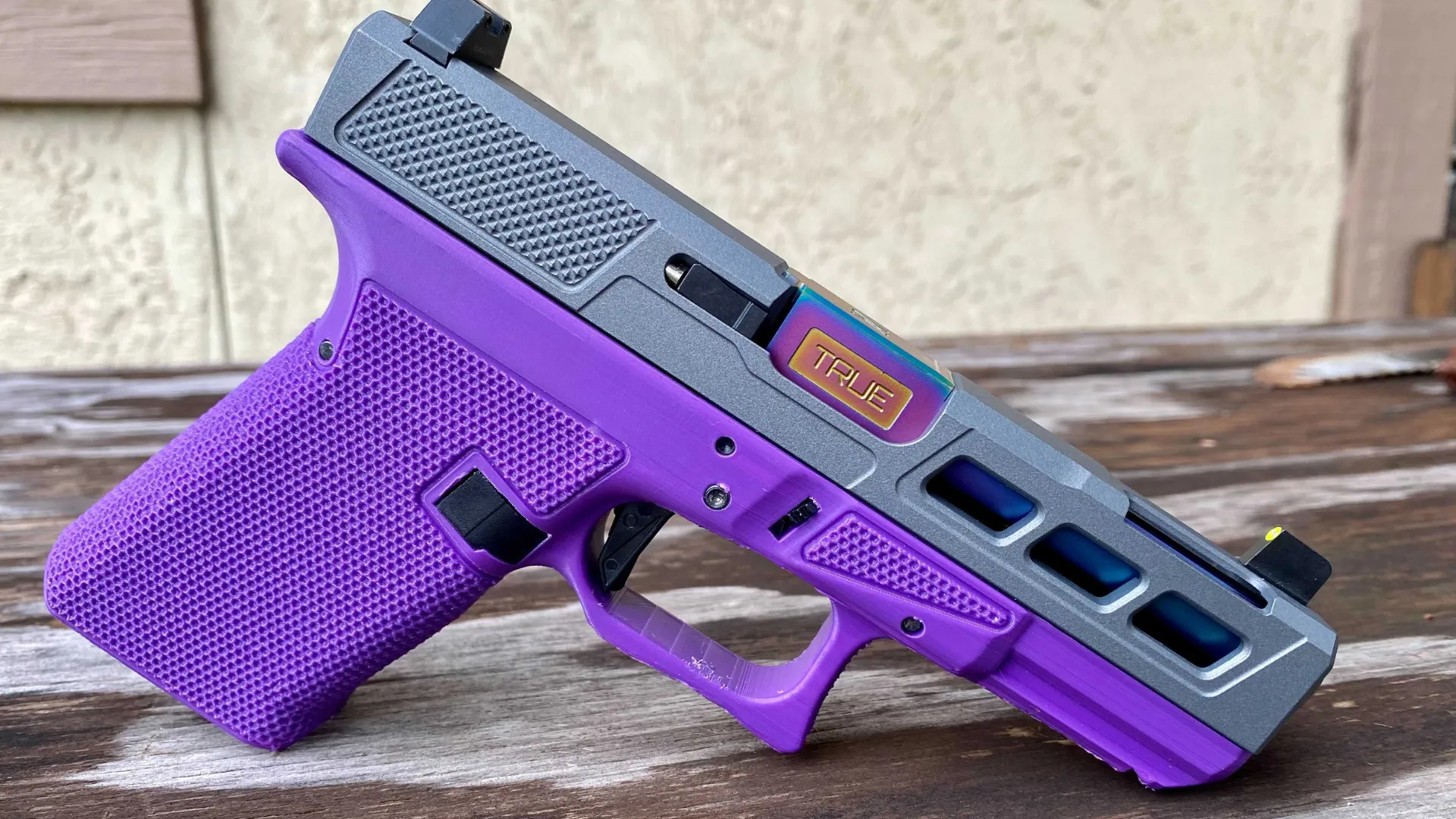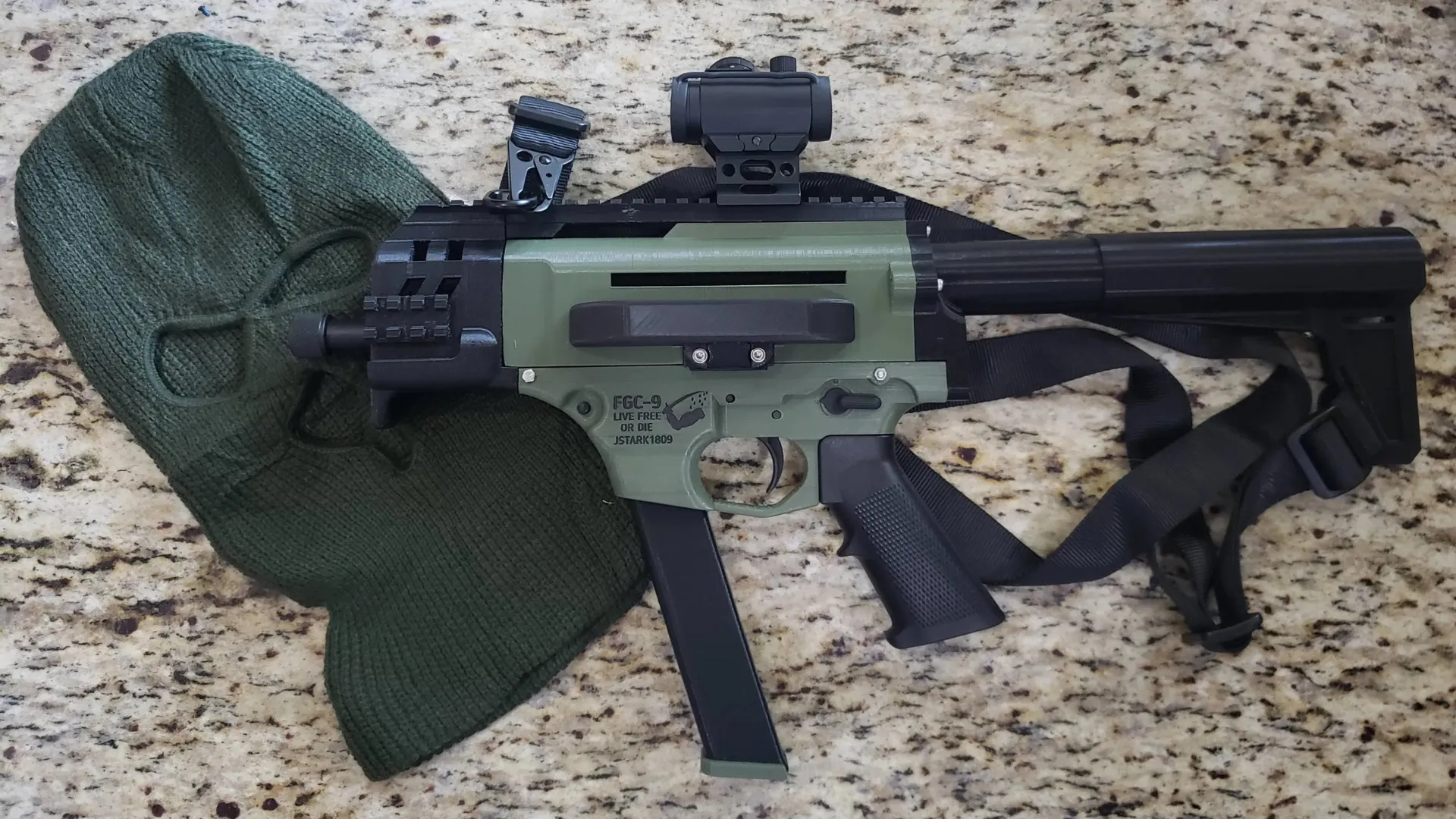Orca AR15 Details
Hoffman Tactical has recently made waves in the gun industry with the release of their fully 3D printed AR-15 rifle, “The Orca”.
This innovative firearm is a game-changer in the industry and has piqued the interest of 3D gun enthusiasts and onlookers alike.
The goal of the project was to print as much of the AR-15 as possible, without compromising the performance. The result is a firearm that replaces many of the components found on a factory AR-15 with printed or non-firearm parts or makes them unnecessary. This includes the upper, lower, handguard, buffer tube, barrel nut, stock, grip, takedown pins, buffer retainer, and more. This list is not exhaustive but gives the reader an idea of the scope of the Orca project.
One of the standout features of The Orca is its unique attachment system. The handguard and stock are attached to the receivers by tapered clips held in place by hose clamps(a usual Hoffman Tactical reinforcement method). The Orcar system is strong and low profile and allows for easy customization of the firearm.
Orca in the Wild
Photos





Video
Orca Tech Specs
The Orca’s split line of the upper and lower has also been fully redesigned from the simple split on a standard AR-15. This has been done to improve the strength of the upper, the upper-lower connection, and make the parts easier to print.
It’s important to note that The Orca is an advanced build, and requires careful consideration and planning before attempting to print. The barrel mount, at a minimum, should be printed from a high-temperature filament, such as glass-filled Nylon. Preferably, the upper and handguard should also be printed from a high temp filament. These requirements, and the need for accurate prints that properly fit together, make this an advanced build aka don’t shoot your eye out.
To make the build process more convenient, the Orca includes Hoffman Tactical’s pre-made supports and modifiers. However, with most printers, the Orca will still require approximately 100 hours of print time. For seasoned 3D gun makers, this should be par for the course.
Required Parts for the Orca AR15
AR15 Parts
The Orca utilizes common and easy-to-find AR15 components:
- Barrel. Mid, carbine, or pistol. 5.56 has been tested. Other calibers use at your own risk.
- Gas block. Low profile. Set screw type, not clamping.
- Gas Tube. Mid, carbine, or pistol depending on the barrel.
- Bolt carrier group.
- Charging Handle. A large latch is recommended. Warhammer is not compatible.
- Carbine buffer mass.
- Carbine buffer spring.
- Fire control group. Drop in or mil-spec.
- Selector switch, detent, and spring.
- Mag catch lever, button, and spring.
- Bolt hold open lever, pin, plunger, and spring.
Hardware Parts
The following hardware is required for completing your Orca build:
- (3) 10-32 heat-set inserts.
- (2) 10-32 x 1.25” Socket Head Screws.
- (1) 10-32 x 0.75” Socket Head Screw.
- (1) 10-32 x 5/32 Set Screw.
- (2) 3/32 x 1.0” Dowel Pin.
- (2) #24 0.5” Wide Worm Drive Hose Camps.
- (1) 0.375” OD 0.192 ID x 0.75” Ceramic Insert.
Optional Parts
Hoffman Tactical states these upgrades are optional, but recommended for durability:
- (4) Brass bushing.
- Muzzle device.
- Optic or sighting system.
- Magazine.
- Fiberglass sleeving for the gas tube.
Tools Required
You will need a standard toolset with the usual firearm-focused tools to complete the Orca AR15 with a few additional specific items:
- Gunsmithing Punch Set
- 3D Printer capable of printing Nylons. E.g., All metal hot end.
- Slicing software with decent computer. Textured files are large.
- Soldering iron capable of installing heat set inserts. I use a 40 Watt iron.
- Drill bits for cleaning out holes.
- Hammer for installing the barrel mount.
- A hydraulic press is nice for installing the barrel mount. Though should not be needed.
- Allen keys.
- Socket driver or wrench for hose clamps.
- Bushing installation tool.
- Flathead screwdriver
Suggested 3D Print Settings
Orca Documentation: Download
To get started with printing The Orca, there are a few things you need to keep in mind. First, you’ll need to import the premade supports into the slicer. This will help ensure that your prints come out clean and accurate.
If you’re printing the version without bushings, you’ll also need to import the bushing blocks. These blocks are an essential part of the firearm and help ensure that everything fits together properly.
The STL files for The Orca are organized into categories within their own folder. This makes it easy to find the files you need and keep everything organized. All of the support and modifier files are within the same subfolder as the files for the part they go with, so you won’t have to hunt around for them.
When it comes to printing the handguard, there are two lengths to choose from. You’ll need to choose the right length based on your gas system. Carbine-length systems use a ~7.5” long gas tube, while mid-length systems use a ~9.5” gas tube. The longer handguard will work with shorter gas systems, so keep that in mind when making your choice.
Slicer Settings
Having tuned and optimal slicer settings is key to producing a clean and long-lasting 3D printed Orca.
All of these steps are covered in greater detail in the instructions provided with The Orca. With a little bit of planning and attention to detail, you’ll be able to print your own fully 3D printed AR-15 rifle in no time.
The Orca suggested 3D printer settings include:
- 0.4 MM nozzle.
- 0.2 MM layer height.
- 0.45 MM outer perimeter line width.
- 0.40 MM top layer line width.
- 0.50 MM line width everywhere else.
- Three walls.
- Five top and bottom layers.
Filament
If you have a filament you think will work for your Orca, try it. Just keep the following priorities in mind for each part:
Barrel Mount:
- Thermal resistance.
- Hardness.
Handguard and Upper:
- Layer adhesion.
- Thermal resistance.
- Stiffness.
Lower and Stock:
- Layer adhesion.
- Stiffness.
Clips:
- Strength.
- Thermal resistance.
TPU Hose Clamp Covers:
- Flexible.
If you are a novice in 3D printing guns, I would use PLA Pro for everything but the clips and
barrel mount. It’s an easy material to print and will let you learn without spending a ton on the filament.
You can also check out our 3D Printing Guns: 101 guide.
Orca AR15 Updates
Hoffman Tactical continues to integrate and inovate around the Orca design.
Catch all of his updates on Odysee or his personal website.
Conclusion
In conclusion, The Orca is an exciting development in the gun industry that showcases the potential of 3D printing technology.
Its innovative attachment system redesigned upper-lower connection, and advanced build requirements make it an attractive option for gun enthusiasts who are looking for a unique and customizable firearm.
While it may not be suitable for everyone, The Orca is a testament to the power of innovation and creativity in the gun industry.
This also further cements Hoffman Tactical as a gun developer who is guaranteed to deliver even bigger innovations in the future.
Is something missing or incorrect?



